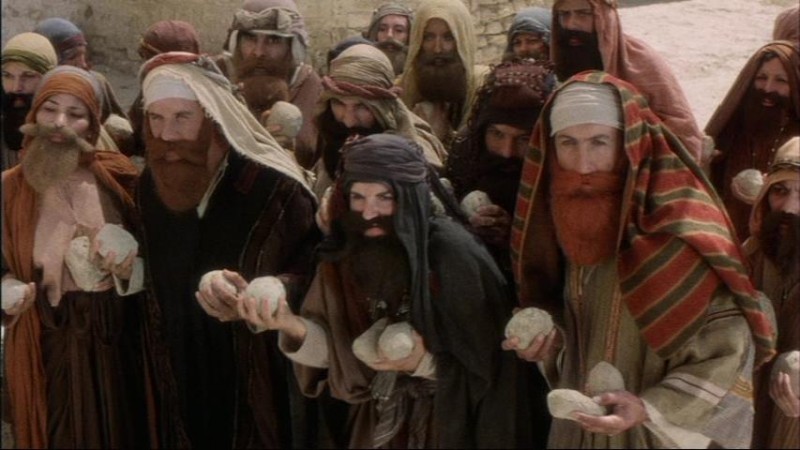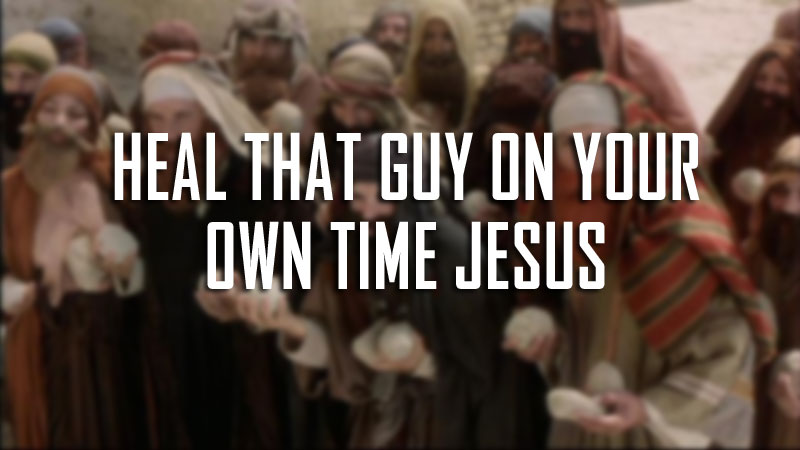
Then he went back in the meeting place where he found a man with a crippled hand. The Pharisees had their eyes on Jesus to see if he would heal him, hoping to catch him in a Sabbath infraction. He said to the man with the crippled hand, “Stand here where we can see you.”
Then he spoke to the people: “What kind of action suits the Sabbath best? Doing good or doing evil? Helping people or leaving them helpless?” No one said a word.
He looked them in the eye, one after another, angry now, furious at their hard-nosed religion. He said to the man, “Hold out your hand.” He held it out—it was as good as new! The Pharisees got out as fast as they could, sputtering about how they would join forces with Herod’s followers and ruin him
There's other similar stories throughout the gospels, in John 5 it's a crippled man at t a healing pool, in Luke 13 it's a woman in so much pain she couldn't even stand up straight. But really, the recipients themselves are just supporting actors for the drama playing out between Jesus and the religious people of his day (Pharisees in the verses above).
Some Background
Before I go much further let's add some quick background.
First up, the Pharisees. In Jesus days the Pharisees were a group of people who were very passionate about their religious beliefs and the proper way to understand the law. They were the ones at church every other day for regular church service (the 9am not the heathen rock band lead 11am service), youth group, pot luck, evening service, Saturday prayer group. These were the people who knew all of the answers to the questions, and everyone knew it (they made sure everyone knew it).
Sabbath was Sunday (basically). It's a day of rest set in place by God himself as part of the creation story (on the 7th day he rested). There are all sorts of different laws and traditions centered around the sabbath (you can't turn on a light switch because that would be considered working on the sabbath), but the main point is it's a very holy day reserved to honor God and remember all that he has done for us.
Back On Track
So we're at a meeting place where everyone is gathered on a Sunday, a holy time when everyone is supposed to be showing reverence to God.
And then in walks this guy named Jesus, and all eyes turn to him. At this point he's managed to build up quite a reputation as kind of a trouble maker, especially with the people in charge and the people who show up to these gatherings. Everyone is expecting some sort of scene.
Jesus doesn't disappoint.
He starts with a question - during this holy and revered time what do we value? Do we follow the rules and do nothing, or do we break the rules to honor the reason they exist in the first place? What is more important, the rules or the reason behind them? Is it better to do good or to do nothing?
Jesus doesn't wait for an answer from the crowd, he answers himself by healing someone, a violation of the rules, and the Pharisees are pissed.
He's not supposed to do that!
He's disrespecting God!
We won't stand for this!
We're going to join forces against you and boycott!
You'll never teach in our synagogue again!
In the Luke version it says the leader was indignant and said "'There are six days of the week for working. Come on those days to be healed, not on the Sabbath.'" (MSG) The leader in this version isn't really against Jesus healing the person, he just thinks it needs to be done on his own time.
Maybe he'd be cool with it if Jesus did it in the lockeroom of the synagogue, before he came out to teach, where no one would see it.

I even think the president called Jesus a son of a bitch and said that he shouldn't be at the temple, maybe not even the country.
Sounding Familiar?
Ok, I made that last one up to try and really drive the point home. But for real, this should sound familiar. We've been hearing all of this a lot lately. I'm sure some of you have said this lately, some of you with more cursing than others -- you know who you are :). This sounds a whole lot like the protests happening within the NFL to call out police brutality and inequality.
But what do we do?
It's not like the Pharisees were wrong to be passionate about keeping the sabbath, and they certainly didn't hate the person that was being healed. They're not bad people for feeling that way. Keeping it 100: when I try to put myself in this story I'm backing the Pharisees, at least at a gut instinct level.
But Jesus asks his question to bring us deeper than that. Is it really honoring God if we have the opportunity to do good but choose not to because we are trying to honor God?
Matthew starts this story with Jesus quoting scripture and saying "If you had any idea what this Scripture meant — 'I prefer a flexible heart to an inflexible ritual' — you wouldn’t be nitpicking like this" (MSG).
It's not about the rules, or the ritual, it's about the ideals that lay behind them. To properly honor those, sometimes the rules and reituals need to be flexed.
I think that is where we are today.
Without the ideals of freedom, justice, and equality for all the flag is just a piece of cloth, the anthem a group of notes with empty words, and military service still commendable but not venerated. It's the ideals that give those the meaning, and we're to honor those ideals and those that carry them out.
But what do we do when we see that we're falling short of those ideals? What do we do when there's someone with a crippled hand? What kind of action suits the anthem best? Doing good or doing evil? Helping people or leaving them helpless?
